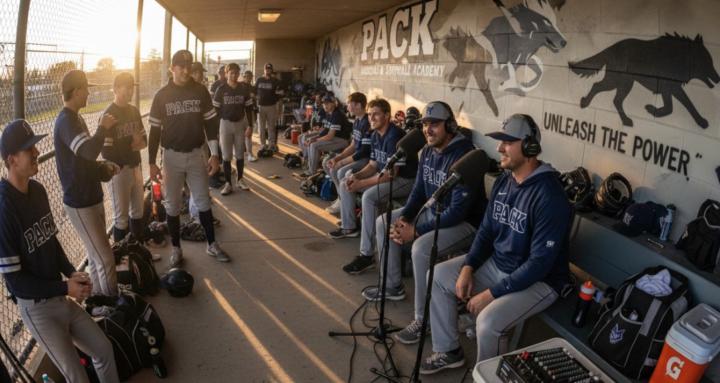Apr '24 (edited) • "Inside The Dugout"
Interview with Coach Matt Phillips (CEO/Founder of Pro Athlete Advantage)
The Importance of Mental Toughness in Sports
Mental toughness is often touted as a critical component of athletic success, yet it remains one of the most misunderstood concepts in sports. While physical skills and talent are essential, the mental aspect can be the differentiator between good and great athletes. Mental toughness encompasses resilience, focus, and the ability to manage emotions under pressure. Athletes who cultivate these traits are better equipped to handle the ups and downs of competition, making it crucial for coaches to prioritize mental training alongside physical preparation.
Creating a Holistic Athlete: Beyond the Field
The concept of a holistic athlete goes beyond just excelling in their sport; it involves developing well-rounded individuals who can thrive in various aspects of life. Coaches play a pivotal role in this development by fostering an environment that encourages personal growth, emotional intelligence, and leadership skills. By integrating mental training into their coaching practices, they can help athletes build confidence, improve their decision-making skills, and enhance their overall performance both on and off the field.
The Role of Coaches in Mental Development
Coaches are not just instructors of physical skills; they are also mentors who can significantly influence an athlete's mental development. By adopting a coaching philosophy that emphasizes mental toughness, coaches can create a culture of accountability and resilience within their teams. This involves teaching athletes how to set goals, manage stress, and maintain a positive mindset, which are all essential skills for success in sports and life. Coaches who prioritize mental training can help their athletes navigate challenges more effectively, leading to improved performance and personal growth.
Building a Supportive Community
Creating a supportive community is vital for fostering mental toughness among athletes. This community includes coaches, teammates, parents, and mentors who encourage open communication and collaboration. When athletes feel supported, they are more likely to take risks, learn from failures, and push their limits. Coaches can facilitate this by promoting teamwork, encouraging peer feedback, and creating opportunities for athletes to share their experiences and challenges. A strong community not only enhances individual performance but also strengthens team dynamics.
Practical Strategies for Mental Training
Implementing mental training strategies can be straightforward and effective. Coaches can introduce short, focused sessions that cover various mental skills, such as visualization, goal setting, and mindfulness. These sessions can be integrated into regular practice routines, allowing athletes to develop their mental skills in a familiar environment. Additionally, using tools like journals or mental training apps can help athletes track their progress and reflect on their experiences. By making mental training a regular part of practice, coaches can help athletes build resilience and confidence over time.
The Impact of Mental Training on Performance
The benefits of mental training extend beyond individual athletes; they can significantly impact team performance as well. Teams that prioritize mental toughness often exhibit improved communication, collaboration, and overall cohesion. When athletes are mentally prepared, they are more likely to perform at their best during high-pressure situations, leading to better outcomes in competitions. Furthermore, the skills learned through mental training can translate to other areas of life, helping athletes manage stress in academics and future careers.
Success Stories: Transforming Lives Through Mental Toughness
Numerous success stories highlight the transformative power of mental toughness training. Athletes who have struggled with performance anxiety, lack of focus, or emotional control have found renewed confidence and success through targeted mental training. For instance, a young hockey player who learned to manage his emotions during games not only improved his performance but also enhanced his relationships with teammates and family. These stories serve as powerful reminders of the profound impact that mental training can have on an athlete's life.
The Future of Coaching: Embracing Mental Skills Training
As the landscape of sports continues to evolve, the importance of mental skills training will only grow. Coaches who embrace this shift and prioritize mental toughness will be better equipped to develop athletes who are not only skilled but also resilient and adaptable. By integrating mental training into their coaching practices, they can prepare their athletes for the challenges they will face both in sports and in life. The future of coaching lies in recognizing the value of the mind in achieving athletic excellence.
Conclusion: The Path to Becoming a Holistic Coach
In conclusion, the journey to becoming a holistic coach involves a commitment to developing the mental side of sports. By prioritizing mental toughness, creating a supportive community, and implementing practical training strategies, coaches can empower their athletes to reach their full potential. The impact of this approach extends beyond the field, shaping athletes into well-rounded individuals who can thrive in all areas of life. As we continue to explore the intersection of mental training and athletic performance, the possibilities for growth and success are limitless.
3
4 comments

skool.com/trainwithpack
Pack Coaching: Weekly Zooms, personalized & expert guidance. Get one-on-one coaching and insight to build a skilled, united, and competitive team!
Powered by





